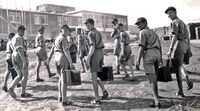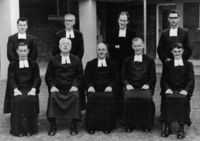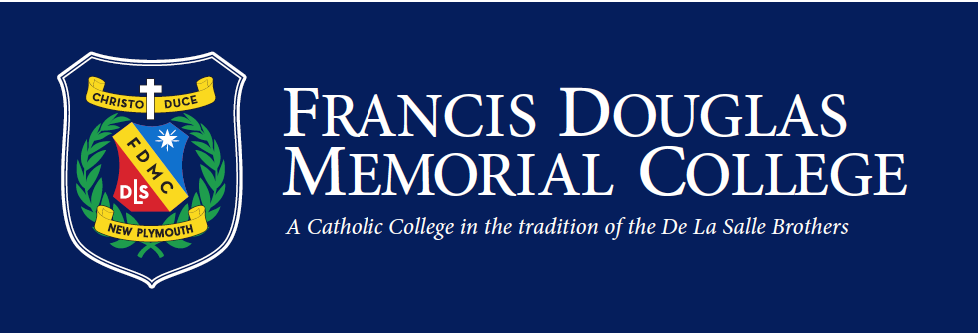
History
An Early History of FDMC (written in 1986)
There was immense relief, gratitude and satisfaction when Francis Douglas Memorial College officially opened to 190 students on February 9th 1959. Taranaki Catholics had long awaited a boys' college in the province and therefore Day One commenced with praise and gratitude to God and jubilation from prior committee men and benefactors.
A meeting convened by Father P Minogue in July 1946, elected an executive who worked tirelessly until 1949 planning and raising finance for the College. Early records indicate precise and gifted administration through Taranaki and Ohura from Father G Donoghue Messrs F Petherham (Chairman), J Corboy, W Finnigan, F Foley, A Hart, F Kennedy, H Scott, J Vogt, P L Morris, N Rush, J Kissick, T KcKenna (Secretary) and later Mr P Phelan. That their immediate families (with the exception of L Morris and P Phelan’s families) would not scholastically benefit from the College did not deter these people from dynamic work. Because the Marist Brothers were unable to staff the proposed College action waned until the mid 1950’s. In 1953 the De La Salle Brothers displayed a definite interest and intimated they would guarantee staffing. This was confirmed in early 1955 and immediately (January 25th) a new committee was formed under the chairmanship of Mr C Monaghan (later because of ill health, replaced by Mr N Hannan) and Secretary Mr D Horton and the Archbishop’s official representative Father Austin. When the Westown Golf Club property became available, the previously purchased Clawton Street site was abandoned and plans were drawn and tenders were called in January 1957. Taranaki-wide Committees assisted the Central Executive with fundraising and a high level of enthusiasm was maintained as the opening date became a reality. The Foundation Stone was laid on November 9th 1957 with the first school day being February 9th 1959.
Francis Douglas Memorial College was officially opened on September 13th 1959 by Archbishop McKeefry, with Archbishop Liston, Bishops Kavanagh and Joyce in attendance. Brother Jerome was appointed Principal in June 1958 and his staff for Year One were Brothers Francis, Alban, Benignus and Fabian with Father M Uhlenberg being appointed the first College Chaplain. Credit for the establishment of this College must be shared by very many administrators but major credit should be channeled to Rev Father G Donoghue, who retired as Parish Priest of Brooklands. As a young Curate in New Plymouth he worked with tremendous zeal and faith among the youth of New Plymouth and surrounding district state schools. His perseverance was intense and he enthused others to an understanding that Taranaki Catholic youth were being disadvantaged in faith. It is with heartfelt gratitude that we record his dynamic contribution and also that of Rev Father Austin who was appointed to liaise with committees and Archbishop McKeefry as the establishment neared reality. A tremendously large number of Taranaki men served on the Central Executive from 1955. There were very dedicated people, allocating hours of their free time to generating financial appeals and voluntary labour for this College. The Old Boys Association offer sincere gratitude to each of these generous persons and also to the very many parents who assisted on the PTA over this period.
1959 – 1964
Christo Duce was proudly displayed as the 30 boarders and 160 day boys assembled on 9th February 1959, the first day of school. The College Motto was accepted as suggested by Brother Julian Watson who was later to become College Principal. He advised that the motto and the colours, Blue, Cardinal and Gold, were chosen as a memorial to Father Vernon Douglas. The Cardinal symbolizes Father Douglas’ sacrifice, blue for his devotion to Our Lady and the gold as his glory. Over the first 25 years there have been very few alterations to the original uniform with the main exception being the cap which caused students major hassles and staff headaches. Where did they disappear to so very quickly?
The tenacity, spirit and energy of our first Principal, Brother Jerome Foley, quickly became obvious to students in his six years of dedicated service. His ability to rise extremely early for prayer, teach the full day, attend to the office duties and then spend the twilight hours in the gardens, shrubbery and planting the trees, was watched in awe by his younger associates and early pupils. The initial driveway shrubs and school frontage trees are a constant reminder of Brother Jerome whose love of God, his Community, staff, student and parents ensure a very memorable and appealing start to this College. We also treasure personal memories of other Brothers who served with such enthusiasm during this period. Boarders especially respected and loved Brother Alban’s vitality, firmness and fairness. He suffered much pain from his illness but maintained heroic strength of silent acceptance in the classroom and with boarder leadership. Brother Francis maintains close contact with College progress and is well remembered as First Officer in command of the Cadets and also coaching and enthusiastic sideline support. Organisation of sports teams and events fell to Brother Benignus whose administration and encouragement was to ensure Francis Douglas Memorial College gained speedy and respected recognition at all sport. Brother has been away from active teaching for many years as he was forced to undertake a heart operation. Brother Justinian is in Central Australia teaching Aboriginals at Balgo Hills. He is a dedicated teacher and always displayed vital interest in the lesser academic ability students. Joining the Community in Year Two, Brother Conrad gave tremendous service to this College. Few are able to match his organisational ability and it was not surprising to see his distinguished prowess sought at a higher level within the Order. He is Principal at Castle Hill, Sydney. When Brother Francis was transferred, Brother Conrad took over Cadet Training setting an outstanding level of challenge for students. Destined to be the second College Principal, Brother Julian gave outstanding service to this school. The early pressure of finance and administration concerns were mastered by competence and tenacity, two of his very many attributes. Brother Julian’s valued service will not be forgotten by those fortunate enough to have been associated with him. Other Brothers to serve this College during this period were Brother Fabian, Brother Julian William who celebrated his Jubilee in New Plymouth, Brother Basil and Brother Philip joining us in 1964 to give long and valuable service at this College.
Mrs McLafferty, a most talented and highly qualified music teacher, recently deceased, joined the staff and taught individual pupils from 1960. The second fulltime staff member to be employed was Mrs L Petty as Matron. Her devoted work for the Brothers and Boarders is certainly remembered and admired. Her maternal counselling and advice settled many a long aching heart.
From 1960 until his death Father M Uhlenberg was College Chaplain. He was a very devoted Priest and never spared his service to individuals, groups and the total community. His contribution, encouragement and exampling student religious vocations was vast. His knowledge of the Taranaki (especially the Inglewood/Stratford) community was comprehensive and his weather forecasting near perfection.
Mr Peter Walsh (1955) made an invaluable academic and sporting contribution to the College. He was to remain for many years before moving to Sacred Heart Girls College. His talented athletic coaching gave participants a near professional dimension and the ability standard lifted future results to a high standard.
Now in Australia Mr George Karam joined the staff in 1961, teaching in the Intermediate Department and he, with Mr Francis-Stead were the first two fulltime lay teachers employed by the College, although Mr Leo Walsh had undertaken long spells of relieving teaching from 1960.
When the classrooms opened in February 1959 staff and students encountered difficulties. Builders had not completed their work. Many boarders slept in classrooms and playing grounds were not completed. Despite these problems the Brothers commenced their vocation of teaching, caring for boarders and developing a healthy appreciation for sport and cultural activity. And so the traditions and College spirit were instigated, improved and developed to the present day. Outstanding results were registered from the first year in all sports. The first Athletic Sports were held at St Joseph’s School and break-up concerts staged in the New Plymouth Opera House.
Six rugby teams were entered in 1959 into competition play and four won their competition. Benildus House started well, winning the Athletics and La Salle were to take the first cricket title. La Sale to the fore of 1961 Athletics held at St Joseph’s. The First Eleven entered for the first time, won the Fifth Grade Competition. In 1961 Paul Death, John Dempsey, Brian Devane, Vince Merwood, Ian Fredericks, Mervyn Stachurski were our first listed Old Boys. Our first Parent Teacher Association, under Chairmanship of Jack Davey, and Secretary Charles Lattimer, was formed in September 1959. Edna Ingle was the first Lady President. The then Apostolic Delegate, Archbishop Furstenberg, visited the College in September 1961.
Fifth Form 1961 were the first thirty to go to the School Certificate examination. Twenty-one passed. Subjects were English, French, General Science, Latin, Mathematics, Commercial Practice. Physics, Chemistry and Geography were introduced to the Sixth Form in 1962. Classes ranged from 14 – 50 with staff teaching all periods, coaching sports teams and the Brothers retiring to look after boarders evenings and weekends. 1963 was the year of our first Form Seven and also the College’s entry to First XV Rugby and first of many wins against De La Salle, Mangere.
Brothers Julian and Justinian celebrated their Silver Jubilees and Brother Julian William his 50 years as a De La Salle Brother.
Work on the gymnasium started in 1964 with tremendous involvement from the boarders and Taranaki wide groups of parents under the guidance and financial wizardry of Brother Fintan. An Oratory and Debating team was formed and travelled to Wellington for competition with other Catholic Colleges. Our first soccer team made a strong start, losing only one game and hockey was introduced for the first time.
The first five years were obviously the formative period of our College. Staff and students of these years have a right to feel pride that the College had enjoyed a memorable start and was already being acclaimed as a very fine Catholic Secondary School.



 Admin Login
Admin Login